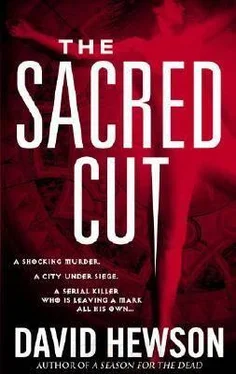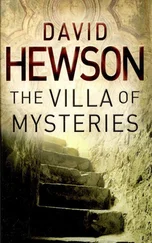She nodded. “Didn’t need to. I lived here in Rome when I was a kid. Nice house on the Aventino. For almost a decade. My dad was based at the embassy for most of that time. Then I did an architecture degree in Florence. And you know what’s funny?”
They didn’t say a word. From her face they could tell this wasn’t funny at all.
“Maybe it’s from the last few years I spent in Washington, but sometimes I must still sound American. It just slips out. You can always tell. You always get someone on a bus or somewhere who gives you a nasty look. Or a little lecture about colonialism and how, being Roman, they just know this subject inside or out. Or maybe they just spit in your face. That happens from time to time too.”
“ ”Always“?” Peroni wondered, taking the argument back an important step.
She sipped at the coffee and pulled a sour face. “No. That’s an exaggeration. Just a lot more than when I was a kid. In fact…” She took her attention off them at that moment, began to conduct some inner conversation with herself. “This was a happy place then. I never wanted to leave.”
“The world’s not so happy anymore,” Costa said. “For all of us.”
“Agreed.” She fidgeted on the hard office chair, uncomfortable at having revealed as much as she had. “I’m still waiting for an answer, though. This guy isn’t Serb or Kosovan or anything. So why are you going through all these records?”
Costa explained about the girl who’d escaped from them inside the Pantheon, and how some Balkan connection was probably the best way to find her, since they controlled the street people as much as anyone did. Then he pushed over the photo Mauro had taken. Emily studied the young, frightened face.
“Poor kid,” she said quietly. “Trying to pick your pocket when she must have been scared out of her mind. Are they really that desperate?”
“Sometimes.” Costa hated simplistic explanations. “It’s what they do. There’s plenty of people out there on the streets who’ll scream ”Zingari!“ every time some petty crime happens. We’ve plenty of other crooks too. But the honest answer is: yes, they’re that desperate. And it’s an organized business. With its own structure. Its own rules.”
“Good,” she said. “That should mean you can find her.”
“Maybe we can,” Peroni conceded.
“Will she have family here? Can you track her down like that?”
“Most of them don’t have family,” the big man explained. “Not what we’d regard as family anyway.”
She couldn’t take her eyes off the photo. It seemed a good time to ask.
“When Leapman called you in for this assignment,” Costa began, “you could have refused, surely. The fact this man murdered your father means you want him caught. But it also means you’re involved, beyond anything the likes of us would expect. You have… something personal invested here. That could worry me.”
Emily Deacon took one last look at the photo, then placed it on the desk. “I could have said no when my dad laid a job with the Bureau straight in my lap. I’d got a good architecture degree. I could have gone on and done a master’s. Here, probably.”
She looked at him, trying to work out the right answer for herself too. “You won’t understand. We’re Deacons. We grow up with a sense of duty. There have been Deacons working for the government for the best part of a hundred years. In the Treasury. The military. The State Department. It’s what we do. We don’t ask why.”
He wondered how much of that she really believed. “And when we find this man. What do you want then?”
“Justice,” she said with plain, flat certainty.
“Is that what Agent Leapman wants too?”
“Joel Leapman is a primitive organism driven by primitive desires.” She spoke with cold, aloof disdain. “It’s thanks to people like him that people like me get spat at on buses. Ask him what he’s after. Not me.” She thought for a moment, then fixed them with her keen, intelligent eyes. “I know exactly what I want. I want to see this man standing up in court, getting convicted for every human being he’s killed. Every life he’s ruined. I want to see him go to jail forever and have those ghosts haunt him each and every day. I want to sleep better knowing that he can’t, because of all the nightmares coming his way. Will that do?”
Peroni cast Costa a sideways glance. The one that said: why do we always get them ?
Nic Costa knew what he meant. He was coming to understand a little about this woman and it didn’t fill him with joy. She wasn’t at the hard end of investigations with the FBI. Of that he was sure. Perhaps Leapman had called her into the Rome inquiry because of her specialist architectural knowledge. Or her perfect Italian. Perhaps it was even simpler than that. Her presence was down to who she was: the daughter of the last victim. The Deacons seemed to be an important family. Maybe Leapman had no choice. Maybe Leo Falcone was in the same position. It would explain the uncharacteristic way the normally abrasive and individualist inspector had rolled over and allowed the Americans to walk straight into the case.
“You think this guy knows Rome?” Peroni asked.
“Like the back of his hand,” she said straightaway. “I’m certain of it.”
“Nah, he doesn’t,” Peroni told her with some certainty. “He thinks he knows it. He’s like you. He goes to Tazza d’Oro and likes it because he feels it makes him Roman, not like some cheapskate tourist throwing coins into the Trevi fountain. Don’t get me wrong. That’s good, because it means he’s trying. You too. But it’s not the real thing. Me and Nic are. This is our town. We drink coffee in places a million times better than Tazza d’Oro. Want some?”
Her delicate eyebrows rose in amusement. “Now?”
Peroni scowled at the plastic cup. “Yeah. Why not? This stuff is piss.”
“And you think it’s going to be easy to find this kid?”
“Absolutely.” He nodded at the computer. “But not sitting in front of the one-eyed monster there. This is a people business, Emily. Night people, if you get my meaning. I got a whole list of them in my head right now. You’re going places in Rome you didn’t even know existed.”
“Really. So if it’s that easy, Officer Peroni-”
“Hey, hey! Gianni. Nic. Please…”
Emily Deacon smiled. “If it’s that easy, don’t you think he might be doing it too? This girl must have seen what happened. She must know things we’d dearly love to hear. Why else would he want to kill her?”
Costa gave his partner a hard look. They should have thought of this themselves. They’d been distracted by the meeting at the embassy, and having an outsider attached to the investigation.
“I’ll drive,” Costa said.
BY THE TIME PERONI was renewing his acquaintance with the first name on his long list of East European hoods, Teresa Lupo was dictating the preliminary autopsy results on Mauro Sandri, running through all the familiar terms she’d come to learn over the years when dealing with firearms deaths, still unable to push what she’d heard in the American embassy out of her head.
Silvio Di Capua was busy cleaning the stainless-steel table, watching her out of the corner of his beady eyes with the same guarded awe she’d come to expect, wondering, perhaps, what she saw in the big old Tuscan cop who was now sharing her home. It was none of his business, even if it was a good question. Gianni Peroni was a good human being: honest, decent and kind, in spite of his tough outward appearance. She liked his company.
At least Silvio Di Capua’s crush on her had waned a little since her assistant realized she was no longer available. He was by the door now, washing his hands and looking ready to grab his too-short black leather bomber jacket and head home for the night when Leo Falcone walked in. She watched with some dismay the way Silvio flinched at the sight of the inspector, like a mouse catching sight of a bird of prey. It occurred to her, not for the first time, that the analogy was appropriate. Falcone, as his surname suggested, had the beady eyes of a raptor and a bare, birdlike skull too. The sharp jut of his goatee only enhanced further the impression of a hunter. He was the kind of person someone like Silvio Di Capua feared the most. Not just for his acerbic tongue or the sudden, direct habit he had of tackling every issue head-on. Worse, much worse sometimes, was the way he never let anything go. This irked Di Capua more than anyone because, when it came to morgue matters, he was the one Falcone chose as the weak point, the place to start poking at with a long, suspicious forefinger.
Читать дальше










